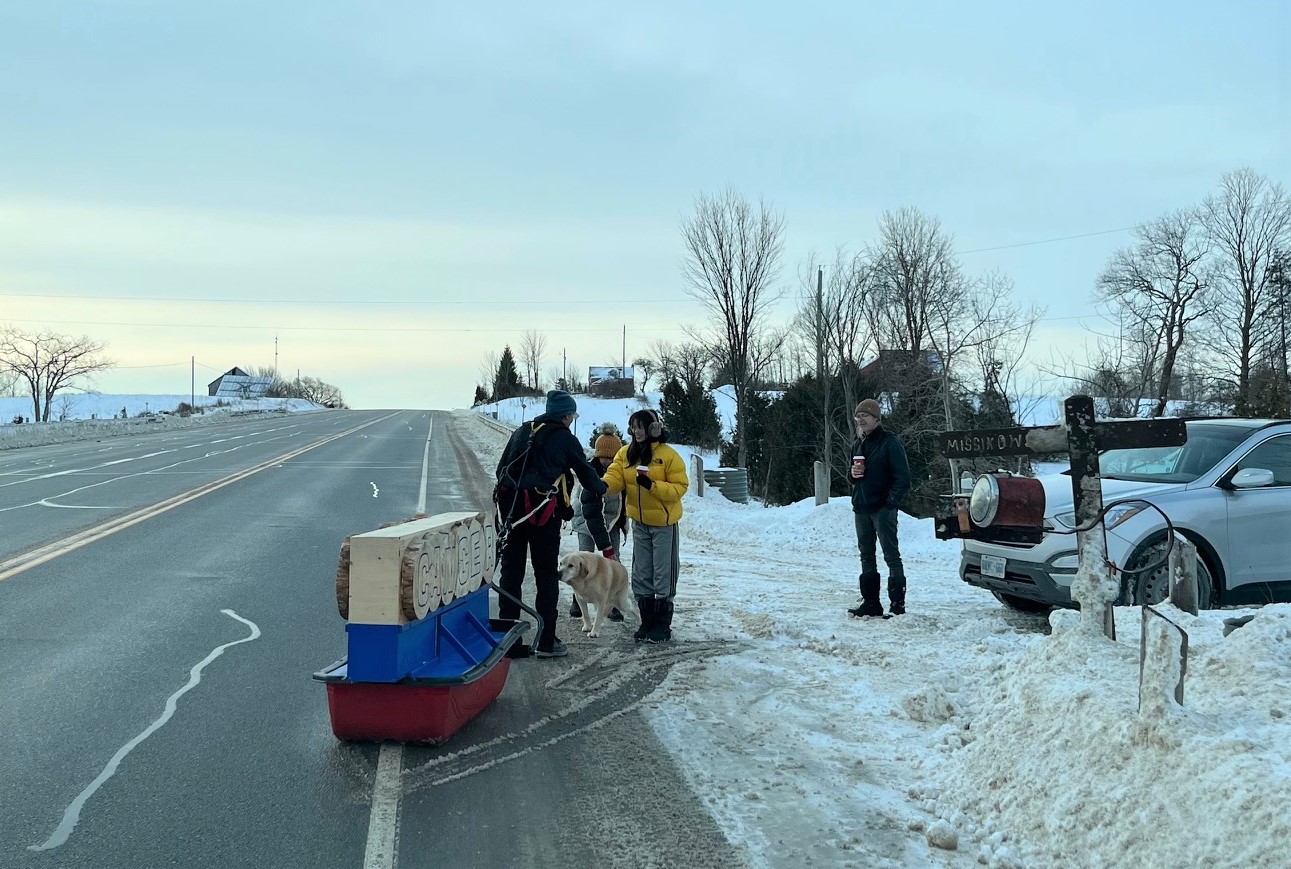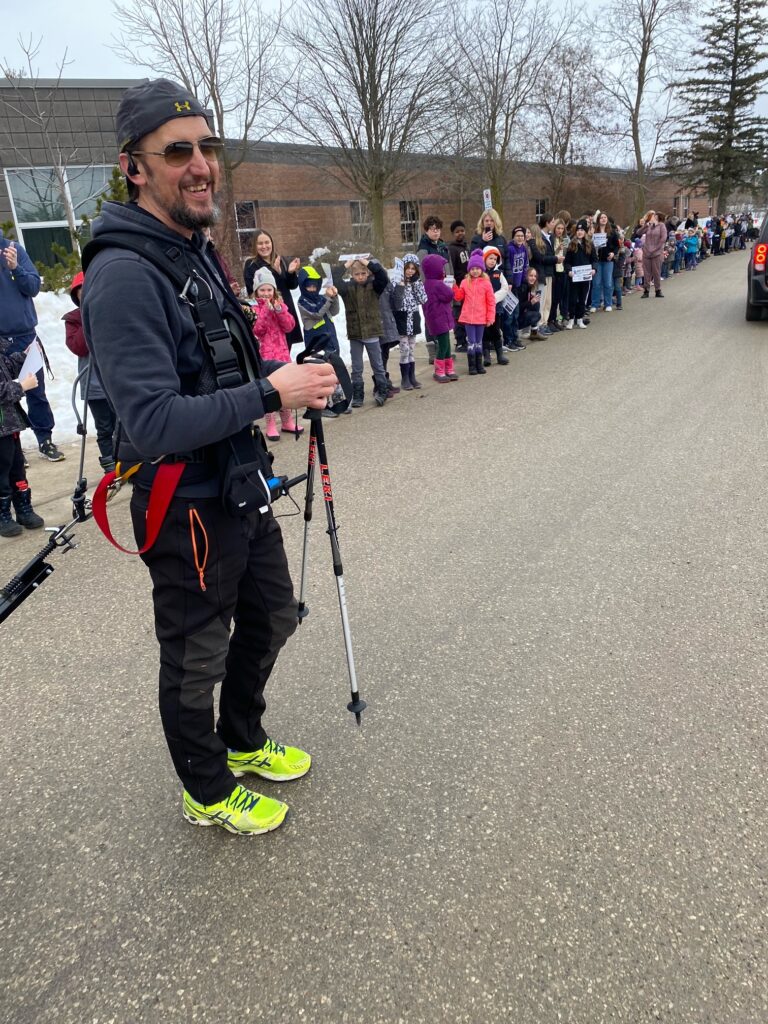When Mike Duhacek was seen pulling his 212-lb snowmobile sled through Burlington earlier this month, laden with the metaphorically and literally heavy pine-carved word “cancer,” he was on the very last leg of his 208-km trek that started in Owen Sound’s Nawash Park.
When we caught up with him, he was home, tired, blistered feet missing a few toenails and too swollen to fit into shoes. But, he said, “it’s all good.” This project, Help Me Bury Cancer is so personal and important that the “good always outweighs the challenges.” Elora resident Duhacek is a civilian employee of the Halton Police Regional Service (HPRS), and is a Cops for Cancer ambassador for the second time; their mission and this walk support childhood cancer research and resources for patients and caregivers.
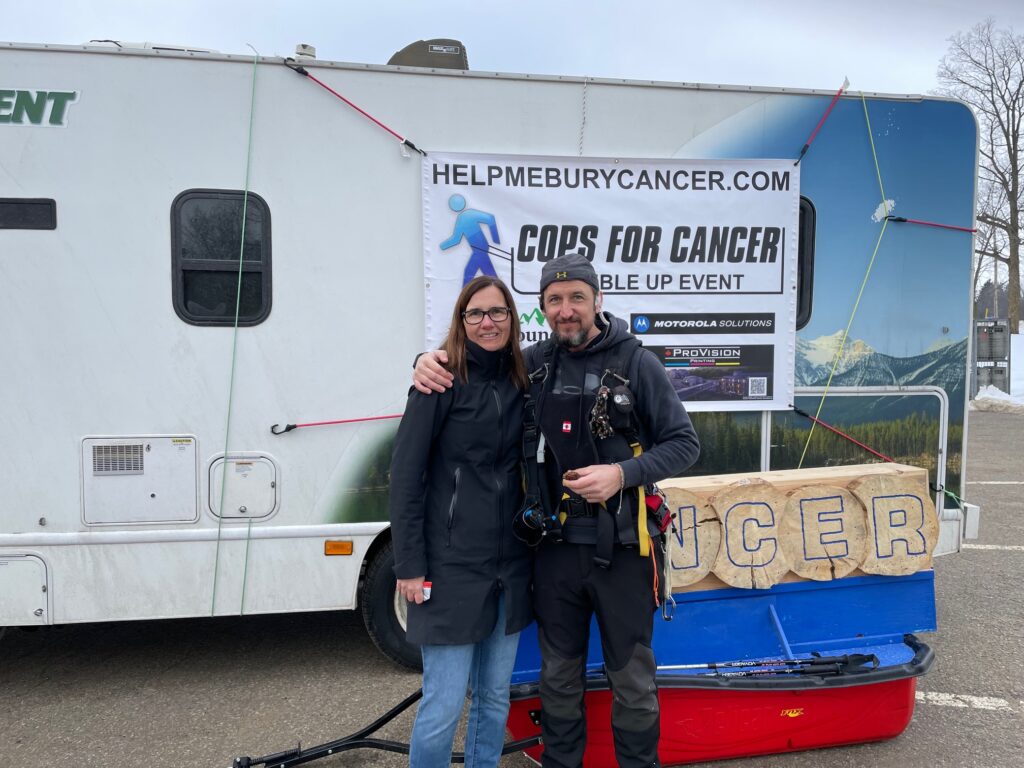
This story started over 10 years ago, when Duhacek’s mother, Liz, was diagnosed with a rare, early stage 4 appendix cancer, soon after losing both of her parents to cancer. Seeing what his mother endured over the course of her treatment made Duhacek want to turn his frustration into something positive.
And so in 2013, he walked from Windsor to Ottawa, pulling a 125-lb sled with the word “cancer,” representing “that heavy weight on a cancer patient’s back, sometimes wondering where the next step is going to come from,” raising money for the Canadian Cancer Society.
With those million steps, Duhacek raised over $30,000 in roadside donations alone.
This year, on the 10-year anniversary of that first long walk to bury cancer, Duhacek did it again, this time on a north-south trajectory, with his Double Up event: the weight of the sled increased and he encouraged others to join in, doubling up on any activity they might normally do, and collecting donations for Cops for Cancer and the Canadian Cancer Society along the way. And 10 years on, his mom is by his side, “right there helping organize” the event, cancer-free and living life.
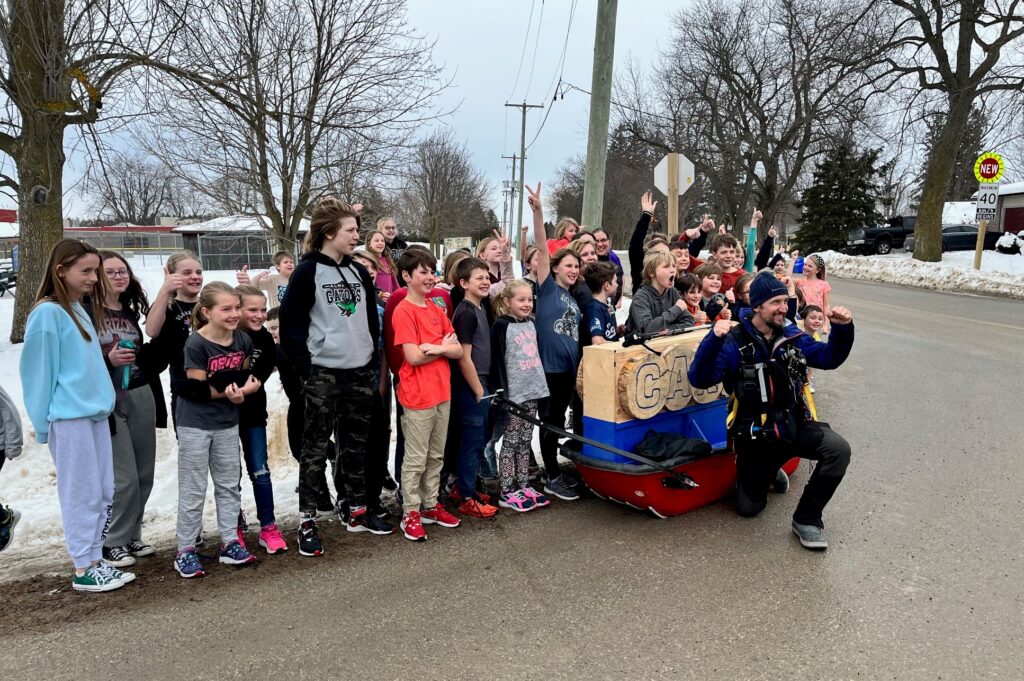
For this journey, Duhacek feels like he is in better shape now at 45 years old than he was at 35 years old. Last time, he suffered from back spasms; this time, he worked at tightening up his core as much as he could beforehand. He started doing more running two years ago, uphill and pulling sleds of firewood, in preparation. But “in the end, there’s no preparing for it, the distances, the weight.”
From that first trek, Duhacek learned that “you can get through a lot, even if you think you’re broken.” And he notes that mindset was very important. He didn’t listen to any music from Windsor to Ottawa; instead, he repeated mantras to keep himself moving. Duhacek estimates that he repeated “Go get it,” to himself 43,000 times during that first walk. He carried that approach with him for his Double Up journey as well.
Duhacek considers himself an “awareness horse,” promoting hope and inspiration, spreading awareness, and leading by example in his Cops for Cancer ambassadorship by walking, as well as assisting in their other fundraising initiatives.
The secondary goal for him is to collect donations, whatever people can afford. Those roadside donations were counted every day, to send on to the Canadian Cancer Society — on this walk, $21,000 was collected from generous people along Duhacek’s route.
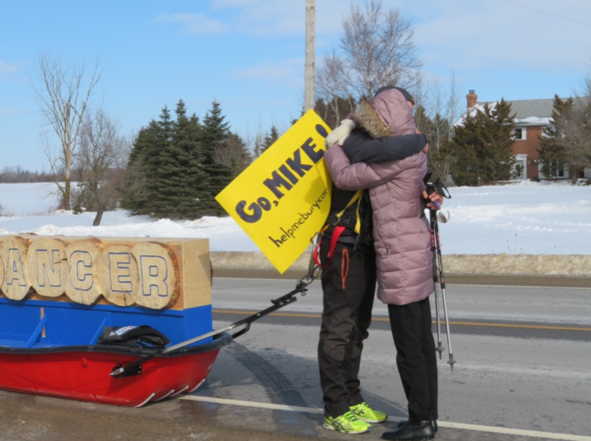
But it’s the people he met along the way, who shared their own cancer stories, that really mean the most to Duhacek: “that’s the good stuff.” He heard over 100 cancer stories each day; people waited along the route with signs encouraging him forward, waiting for him with food. “It was extremely touching having people I don’t even know bringing me breakfast, lunch, dinner; cancer survivors bringing out homemade cookies.” And the food is not only emotionally affecting, but also very useful: Duhacek burned 600 calories per hour on this trek and had to triple his consumption to keep his energy up.
People walked with him, too. An older woman walked kept him company for awhile, and the mayor of Mapleton, Gregg Davidson, joined Duhacek for a gruelling 11 km on day 4, when there were massive headwinds at 60 km/h and freezing rain.
Duhacek, who considers HPRS his second family, appreciated the police support along the way too; local officers acted as escorts, Halton sent some cruisers, and the OPP were there between towns. He says everyone at the HPRS has supported him the whole way, promoting the trek on social media, encouraging the whole initiative; “I just love them.”
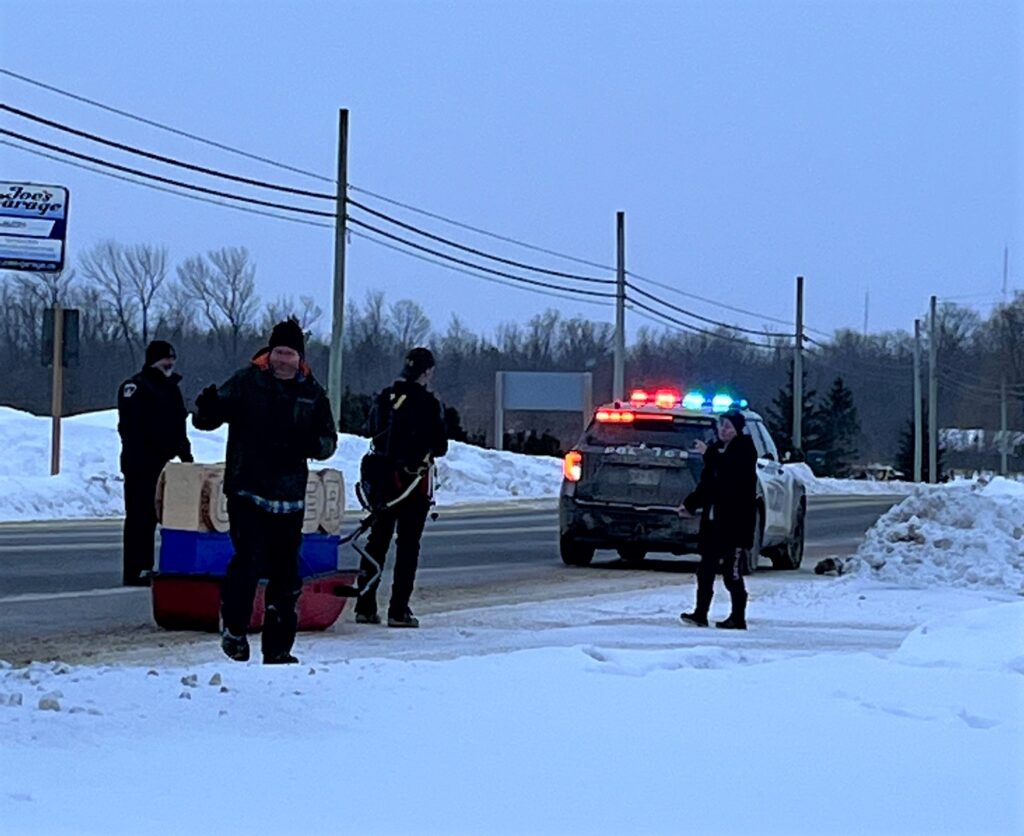
His first family was also alongside him the whole way: his two teenage sons joined him the first weekend, travelling and helping in the team RV, and his wife and six-year-old daughter joined when they could along the route. His sister, brother-in-law, and best friend rounded out the team, taking RV-driving shifts, helping with other tasks, and providing moral support.
Though Duhacek has tried to teach his kids that there’s nothing they can’t do, his oldest son turned the tables on him on day 1 of his trek, when Duhacek was ready to give up for the day. Duhacek says that the first day out of Owen Sound was physically the toughest day of his life. “It was -28º with windchill, 32 headwinds driving me, and I was going uphill on a massive grade,” he remembers. “After 33.5 km, I dropped to my knees…my face [was] freezing. There I was, on my knees, in the middle of the country, snow banging on my back.” He felt a hand on his back. His oldest son had stepped out of the RV to show him a map on his phone. “Dad, you’ve got 1.5 km to go. Get up and get there.” Duhacek said that if not for his son’s encouragement that day, he might not have got up and gone to that day’s checkpoint.
Duhacek notes that while these journeys try to replicate, in some small way, the journey cancer patients experience, he doesn’t truly understand what the cancer journey feels like. He does hope to inspire people to understand that they’re not alone and probably stronger than they think. He also understands that even if cancer patients get to hear those wonderful words, “you’re cancer-free,” that “it’s always in the back of your head, [that] little black ball of fear” of recurrence, the anxiety that often comes alongside follow up tests (what, in the cancer community, is called “scanxiety”).
And so, Help Me Bury Cancer continues. Duhacek did indeed bury his “cancer” burden at the end of his journey at HRPS headquarters in Oakville, after a particularly difficult final 10 km, which saw the runners of the sled pop off, leaving him with no traction. It felt, Duhacek said, “like I was pulling 1000 lb.”
He was met by an honour guard, bagpipers, friends, family, and all his coworkers at the pre-dug burial spot. “Now,” Duhacek said, “the word I built out of a Canadian pine tree, is under earth at headquarters.” There are plans in the works to build a cancer garden around the burial site, a place for all those affected by cancer can go and reflect on their own journeys or remember their loved ones.
And will Duhacek make another of these long journeys with the aim of burying cancer? He hasn’t said no…but will give his feet some time to heal first.
If you’d like to support Help Me Bury Cancer, you can donate via Duhacek’s website and on his Canadian Cancer Society donation page. You can also purchase his book, One Foot in Front of the Other: The Journey of a Million Steps, proceeds of which go to the Canadian Cancer Society, on Amazon or Indigo.

